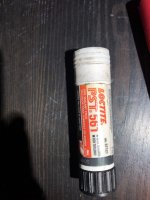jdeas
Well Known Member
What are mechanics using to seal the 1/2" pipe plugs in the sump? Twice I tried Teflon paste without getting a good seal.
In plumbing use, RectorSeal #5 on course thread pipes always gives me better results than teflon tape or paste. Has anyone used RectorSeal #5 to seal sump plugs? See any reason why RS #5 would not be appropriate?
In plumbing use, RectorSeal #5 on course thread pipes always gives me better results than teflon tape or paste. Has anyone used RectorSeal #5 to seal sump plugs? See any reason why RS #5 would not be appropriate?





